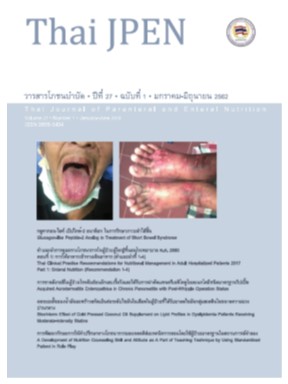การพัฒนาทักษะการให้คำปรึกษาทางโภชนาการและเจตคติต่อเทคนิคการสอนโดยใช้ผู้ป่วยมาตรฐานในสถานการณ์จำลอง
คำสำคัญ:
ทักษะการให้คำปรึกษาทางโภชนาการ, เจตคติ, ผู้ป่วยมาตรฐานบทคัดย่อ
การศึกษาผลของการสอนด้วยสถานการณ์จำลองโดยใช้ผู้ป่วยมาตรฐานต่อทักษะการให้คำปรึกษาทางโภชนาการและเจตคติต่อเทคนิคการสอน เครื่องมือที่ใช้สอนได้แก่เนื้อหารายวิชาจากการบรรยายภาคทฤษฎี 10 หัวข้อ และการฝึกปฎิบัติโดยใช้ผู้ป่วยมาตรฐาน 4 ครั้ง เครื่องมือที่ใช้ในการประเมินได้แก่ 1) แบบประเมินทักษะการให้คำปรึกษาทางโภชนาการด้วยตนเอง 2) แบบประเมินทักษะการให้คำปรึกษาทางโภชนาการจากอาจารย์ผู้สังเกตการณ์ 3) แบบประเมินเจตคติของผู้เรียน กลุ่มตัวอย่างเป็นผู้เรียนระดับปริญญาตรี สาขาการกำหนดอาหาร ชั้นปีที่ 3 โดยสัปดาห์ที่ 0 ดำเนินการเก็บข้อมูลทักษะการให้คำปรึกษาจากผู้เรียน ในสัปดาห์ที่ 6 และ15 ดำเนินการเก็บข้อมูลทักษะการให้คำปรึกษาและเก็บข้อมูลด้านเจตคติ จากผู้เรียนและอาจารย์ ผลคะแนนรวมเฉลี่ยของแบบประเมินทักษะการให้คำปรึกษาด้วยตนเองใน 3 ระยะ (n=27, สัปดาห์ที่ 0 17.15±6.66 สัปดาห์ที่ 6 คะแนน 19.46±7.64, สัปดาห์ที่ 15 คะแนน 22.04±7.39, p=0.023) ผลคะแนนประเมินจากอาจารย์ ใน 2 ระยะ (สัปดาห์ที่ 6 29.74 ± 4.28, สัปดาห์ที่ 15 32.30 ± 4.26, p<0.001) และผลด้านเจตคติพบว่าผู้เรียนมีคะแนนความพึงพอใจต่อการฝึกปฎิบัติฯเพิ่มขึ้น (สัปดาห์ที่ 6 3.00 ± 0.75, สัปดาห์ที่ 15 3.38 ±064, p=0.03) สรุปได้ว่าการสอนโดยใช้ผู้ป่วยมาตรฐานในสถานการณ์จำลองได้ผลในการส่งเสริมทักษะการให้คำปรึกษาทางโภชนาการและเจตคติของผู้เรียนสาขาการกำหนดอาหาร
เอกสารอ้างอิง
Henry B, C. Duellman M, Smith T. Nutrition-Based Standardized Patient Sessions Increased Counseling Awareness and Confidence Among Dietetic Interns. Topics in Clinical Nutrition. 2009. 25-34 p.
Schwartz VS, Rothpletz-Puglia P, Denmark R, Byham-Gray L. Comparison of standardized patients and real patients as an experiential teaching strategy in a nutrition counseling course for dietetic students. Patient education and counseling. 2015;98(2):168-73.
Williams RG. Have standardized patient examinations stood the test of time and experience? Teaching and learning in medicine. 2004;16(2):215-22.
Kruijver IP, Kerkstra A, Bensing JM, van de Wiel HB. Communication skills of nurses during interactions with simulated cancer patients. Journal of advanced nursing. 2001;34(6):772-9.
Lane C, Rollnick S. The use of simulated patients and role-play in communication skills training: a review of the literature to August 2005. Patient education and counseling. 2007;67(1-2):13-20.
Sullivan BJ, Schiller MR, Horvath MC. Nutrition education and counseling: knowledge and skill levels expected by dietetic internship directors. Journal of the American Dietetic Association. 1990;90(10):1418-22.
Lu AH, Dollahite J. Assessment of dietitians' nutrition counselling self-efficacy and its positive relationship with reported skill usage. Journal of human nutrition and dietetics. 2010;23(2):144-53.
Hampl JS, Herbold NH, Schneider MA, Sheeley AE. Using standardized patients to train and evaluate dietetics students. Journal of the American Dietetic Association. 1999;99(9):1094-7.
Henry BW, Smith TJ. Evaluation of the FOCUS (Feedback on Counseling Using Simulation) instrument for assessment of client-centered nutrition counseling behaviors. Journal of nutrition education and behavior. 2010;42(1):57-62.
Horacek TM, Salomon JE, Nelsen EK. Evaluation of dietetic students' and interns' application of a lifestyle-oriented nutrition-counseling model. Patient education and counseling. 2007;68(2):113-20.
Glanz K, Tziraki C, Albright CL, Fernandes J. Nutrition assessment and counseling practices: attitudes and interests of primary care physicians. Journal of general internal medicine. 1995;10(2):89-92.
ดาวน์โหลด
เผยแพร่แล้ว
รูปแบบการอ้างอิง
ฉบับ
ประเภทบทความ
สัญญาอนุญาต
เนื้อหาและข้อมูลในบทความที่ตีพิมพ์ลงใน Thai JPEN วารสารโภชนบำบัด ถือเป็นข้อคิดเห็นและความรับผิดชอบของผู้เขียนบทความโดยตรงซึ่งกองบรรณาธิการวารสารไม่จำเป็นต้องเห็นด้วยหรือร่วมรับผิดชอบใด ๆ
บทความ ข้อมูล เนื้อหา รูปภาพ ฯลฯ ที่ได้รับการตีพิมพ์ใน Thai JPEN วารสารโภชนบำบัด ถือเป็นลิขสิทธิ์ของ Thai JPEN วารสารโภชนบำบัด หากบุคคลหรืหน่วยงานใดต้องการนำทั้งหมดหรือส่วนใดส่วนหนึ่งไปเผยแพร่หรือเพื่อกระทำการใด จะต้องได้รับอนุญาตเป็นลายลักษณ์อักษรจาก Thai JPEN วารสารโภชนบำบัด ก่อนเท่านั้น



